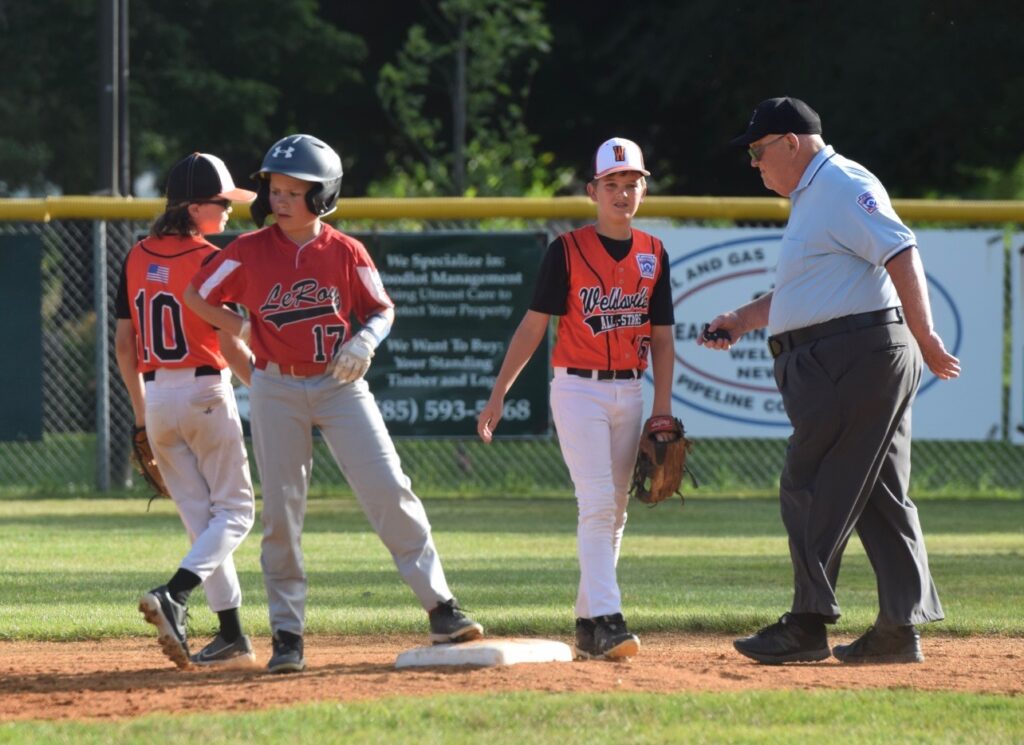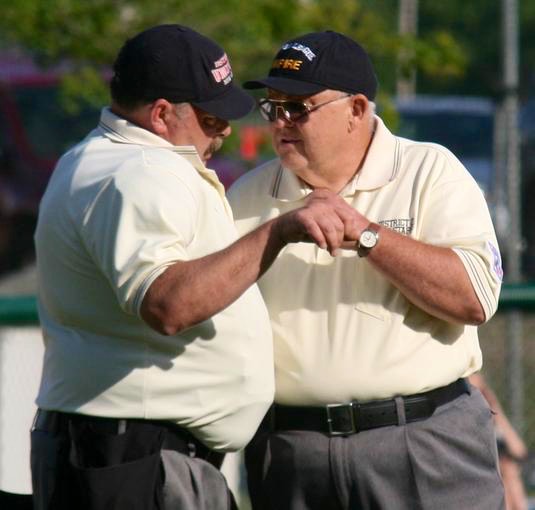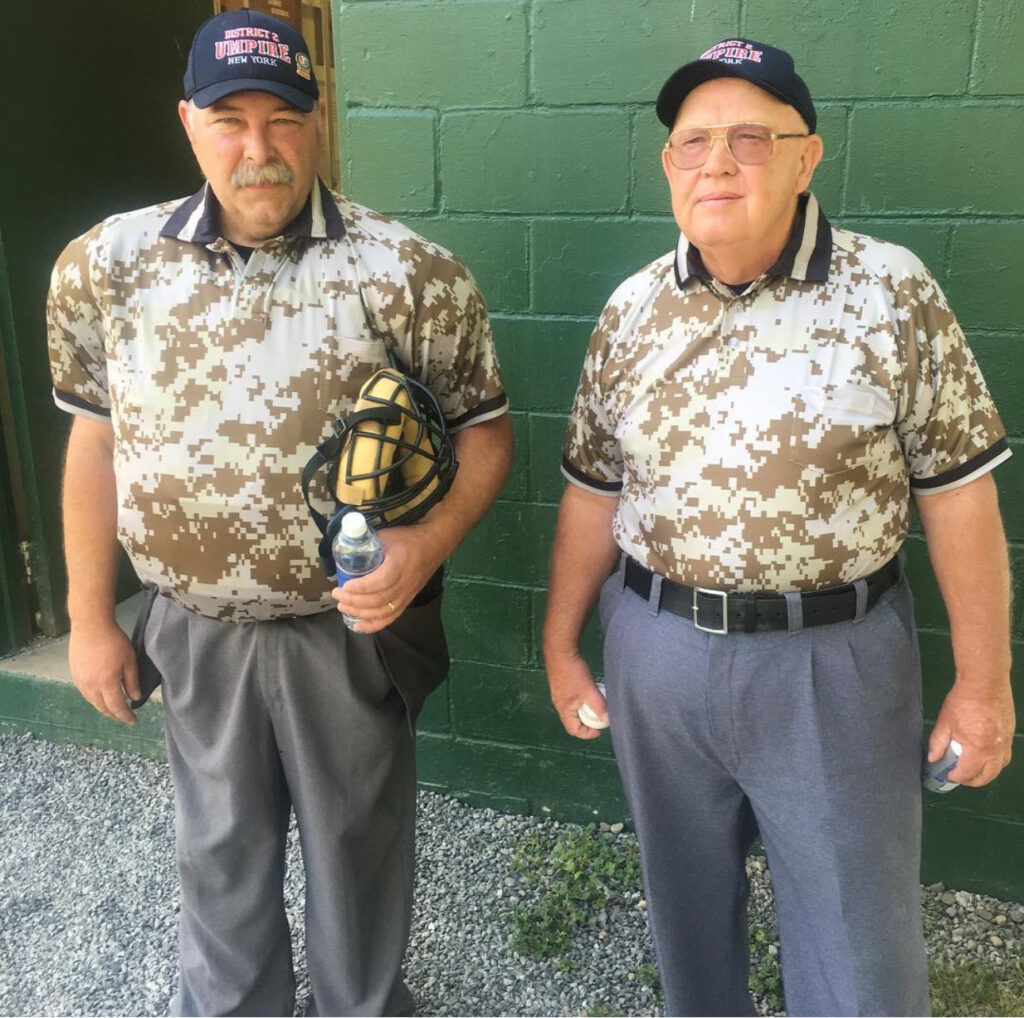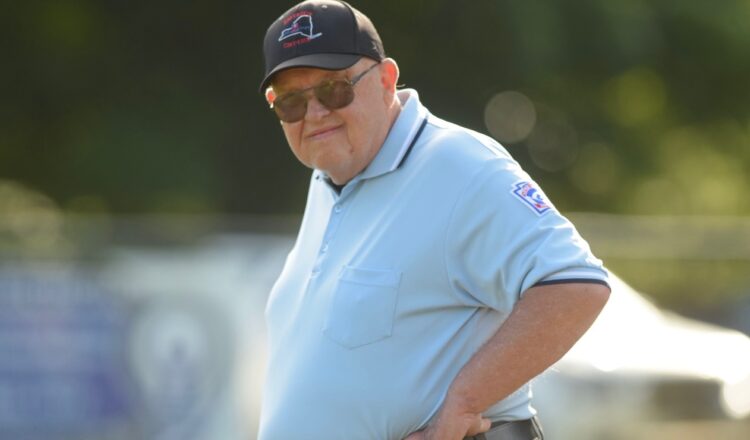A column by JOHN ANDERSON
(Photo: Ron Coleman this past summer umpiring the Little League district championships. John Anderson photo)
There is something about an iconic duo. You know you are getting the best of the best. When it came to music, it’s Lennon and McCartney, Simon and Garfunkel. In crime fighting and westerns we had Starsky and Hutch and Butch Cassidy and the Sundance Kid.
You knew the job would get done, and you would be entertained.
For 47 years in Little League and high school baseball the same could be said for another iconic duo: Brooks and Coleman.
In Little League, where umpires are volunteers (and they have umpired ages 8 to 18 in the Little League summer programs), you were honored to have them on a regular season game. Because when it came time for Little League all-stars, the regional, state and national tournaments, they were there.
On Monday, Sept. 23, 2024, the volunteers from so many organizations took pause. Word came of the passing of Ron Coleman. And the pause lasted a few more days for his partner, Brooksie.
That’s when I knew it was time to sit down and write about the incredible public, yet intensely private life of Ron Coleman. I had to wait until Bob Brooks was ready to talk. He knew his friend was battling a few cancer-related issues, but this was sudden.
It gave me a chance to remember something special in 2007. Ron had been umpiring over 20 years by this point, but was really only known in Wellsville Little League and by teams in District II, from Salamanca to Fillmore.

It’s hard to describe Ron’s physique, but he was the most in-shape person in the world who could be compared to the guy from the board game Operation with the laugh and smile of Santa Claus.
On the diamond, his safe and out calls were legendary. His arm came up on an out call and never moved, but his body looked like something John Travolta would be proud of in Saturday Night Fever. His safe calls were so violent, there were times you thought those flapping wings were going to lift him airborne.
Then there were the called strike three’s.
It’s something umpires don’t talk about much, but a called strike three is a tremendous moment for the pitcher, the defense and the fans. But it’s also a demoralizing moment for the child in the batter’s box. Ron Coleman had a special way of ringing up a batter with the strike three that not only drew cheers, but left a child and the other team knowing their opponent did something special and it wasn’t something to quit over. Grab your glove and play defense because another at bat is coming. In Little League and in life.
Which brings me back to 2007. Wellsville Little League hosted the New York State Final Four. The eventual Little League World Series Champions from Maine Endwell arrived. A team from Long Island with a hitter who won the home run derby, blasting baseball’s out of Island Park kids are still looking for. Another team from Pine Bush with a trailblazing girl at shortstop. And then a magical team from East Harlem.
Maine Endwell had won their game and the kids were eating their free hot dog and washing it down with a root beer when they were ready to head the the hotel. I had just finished interviewing the coach and we were just standing together as the field was being prepared for the next game. The manager told his other coaches and players, “Wait, I want to stay a few innings.”
I assumed he was going to scout, but he had seen these other two teams play and beat them both. It was evident they had the rested pitching to win the whole thing. That’s when he said, “We have to stay to watch this umpire.” Sure enough, here comes Brooks and Coleman. The bellowing Brooks behind the plate and Ron was on the bases. The kids and coaches sat on the metal bleachers laughing and cheering the umpire.
We had something special.
I learned that years earlier. While I had coached my share of baseball, I had not coached Little League. There is a reason I am on the board as the coaching coordinator today. I was that dad who thought each game was the World Series and 9-out-of-10 of our kids were going to be drafted. Not too many people will credit umpires for making them a good coach. Brooks and Coleman took the time to talk to me about coaching and kids. Once I had my stuff figured out, they never stopped.
And to hear them compliment you is a great feeling. I was fortunate to have an incredible group of Little League Senior League players who won states and made a run in nationals. But the best compliment I received was a year I coached an 11-year-old all-star team. The best players went to the 9-10 team and the 11-12 team. There were barely enough kids left to fill a team, but as a varsity baseball coach, I know some of the best kids at 11-12 may not even play in high school and other kids develop late. That 11-year-old team scrapped, won the area and got blown out in districts in two games by Portville. Brooks and Coleman walked out to second base when I was picking up the bases and said that was the best coaching I had ever done. It made me realize how much these two cared about all the kids even though they were not coaches.
The rest of the world noticed, too. In 2018, the Little League World Series in California for the 50-70 division (ages 13) in 2018 featured Ron Coleman. There he was on national television impressing the announcers like he did the Maine Endwell manager. In 2014, the world was introduced to Mo’Ne Davis, a female Little League pitcher from Philadelphia who during the Little League World Series threw the first female shutout in history on Aug, 15, 2014. The temperature was 90 degrees and the humidity was 90. And the announcers praised an umpire sweating in a black shirt that day on ESPN: Bob Brooks.
Ron and his wife, Penny, would walk past my house on occasion. Those walks would intensify leading up to the high school and Little League season. Ron could move and he was in great shape. They would stop for a moment and ask about my life and family and continue on. Those 60 seconds had me scratching my head. “How does he know so much?”
As I pondered this, my phone rang. It was Bob Brooks.
“I’m ready to talk about Ron.”
For over 40 years, the two talked baseball, Bob would visit him on the porch, but he only knew the surface.
“I learned more about Ron from his obituary than I knew in real life,” Brooks said with a laugh. “The thing we learned over the years, Ron is a private person, both him and Penny. he could have catastrophic stuff going on and he would smile and ask how you and your family were doing. Just like this episode here … ” as Brooks’ voice trailed off.

This past spring and summer, Ron, who was 72 when he passed, umpired a full slate of high school and Little League games. He was an assigner of umpires as well. No one knew he was receiving radiation for a cancerous tumor in his throat.
We didn’t know it when he took a blistering line drive off the leg umpiring a high school game and stayed in, and we didn’t know it when he lost his voice in the third inning of a Little League playoff game on one of the hottest days of the year in July.
“He survived a heart issue, had a defibrillator to keep it normal. His leg could be half-broke off and he would stay in there,” Brooks said. “He is going to be missed. When he was the assigner, you would call and couldn’t do a game and even if it was his only night off, if he couldn’t find someone, he would cover for you and never say a word.
“He would bend over backward for you. If you needed a favor, he was on it. That’s the definite hard part … and I’m heart-broken for Penny,” Brooks said.
Brooksie remembers in 1987, his Little League partner Dan Russo didn’t have time for the everyday grind and he needed a new partner. At Hank Sinkey Field in Wellsville over the next 30 years, like a bowling league team, Brooks and Coleman worked every Tuesday and Wednesday night.
“It was not only just us paired up, we had the District II core group with Dale Goodell, Marty Burrows, Craig Plaisted, Ron, myself and of course, the late Don Jordan.”
That crew is as good as they get. But there was only one Ron Coleman.
“No one will ever be able to copy his style, especially a close play at first where a guy is safe and he’s flapping like a giant vulture out there. It happens instantaneously, it’s not planned,” Brooks said. “They tell us in umpire school when you have a close play, sell it. Well, he was the realtor, the stockholder and owner of it! He did the same with strike three. Nobody will ever come close to copying him … He was the price of admission. Even putting him on the lonely side of third base, he still made it exciting over there.”
Brooks said they had their own hand signals before a play happened that covered almost every situation. When the ball was hit, they moved into position and were always on top of the play. Then there was the rule book.
“That dude was a rule book with two legs. He could recite that rule book verbatim. He would rattle it off. He would say there’s no doubt there was obstruction and this is why. If anyone had a problem, he would explain it to a coach,” Brooks said.
Outside of baseball, Coleman has made his mark on the business community. Quietly. He worked at Air Preheater and when Pizza Hut was having issues, he took that over as manager. When Dresser-Rand closed, then re-opened with Kinley Corporation at the helm, Ron had the title of maintenance manager, but that meant he knew every inch of the building and helped get jobs and manufacturing going in record time.
Sam Wilson played Little League baseball in Wellsville. He was umpired by Ron Coleman. Like Ron, Sam moved up the ranks in his profession, from a sports writer to a sports editor in Salamanca and now in Olean as a sports editor with the Olean Times Herald and Bradford Publishing Group.
While in Salamanca, he interviewed Ron for a story that appeared in several newspapers.
Coleman admitted getting to do a World Series was an honor.
“That’s everybody’s wish if they’re really into the game. As far as a Little League event, that’s the pinnacle. That’s like asking a Major League Umpire, did he get to work a World Series game?” Coleman told Wilson. “There’s seven World Series games that Little League plays, three for the girls and four for the boys and there’s only something like (92) umpires chosen worldwide to umpire those games. It’s quite an honor.”
Today, the funeral took place for Ron, an Army veteran, at the West Union Mennonite Church Cemetery. Military Rites were accorded by members of Wellsville’s Morrison Hayes American Legion Post #702’s Honor Guard.
Ron was active in youth groups with Penny, which led him to being asked in 1987 to help umpire the minor league kids, most ages 8, 9 and 10.


While Ron Coleman’s ability to umpire was at the national level, Sam Wilson’s interview really puts the humbling nature of the man in perspective. Ron would rather be umpiring in the development division that the big boys.
“The Minor League is the place to be because those kids are so attuned to learning, it’s really nice … I’ve always enjoyed it,” Coleman said. “I’ve lived in Wellsville all my life and it’s a good way to give back to the community.”
(John Anderson is a contributing editor and writer to the Wellsville Sun. He can be reached at jandersondigitalmedia@gmail.com)






